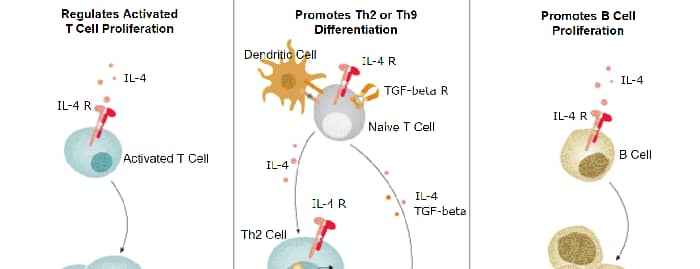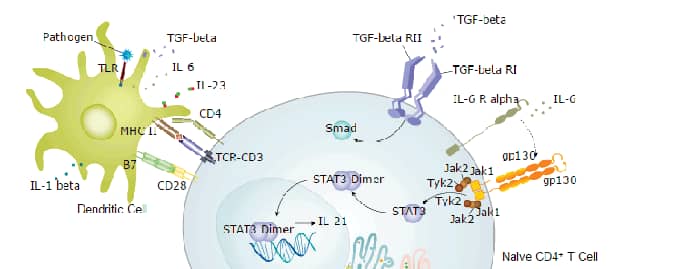Recombinant Human TGF-beta 1 PLUS, Animal-Free Protein
Recombinant Human TGF-beta 1 PLUS, Animal-Free Protein Summary
Product Specifications
Product Datasheets
Carrier Free
CF stands for Carrier Free (CF). We typically add Bovine Serum Albumin (BSA) as a carrier protein to our recombinant proteins. Adding a carrier protein enhances protein stability, increases shelf-life, and allows the recombinant protein to be stored at a more dilute concentration. The carrier free version does not contain BSA.
In general, we advise purchasing the recombinant protein with BSA for use in cell or tissue culture, or as an ELISA standard. In contrast, the carrier free protein is recommended for applications, in which the presence of BSA could interfere.
Qk010
| Formulation | Lyophilized from acetonitrile/TFA |
| Reconstitution | Resuspend in 10mM HCl at >100 µg/ml, prepare single use aliquots, add carrier protein if desired. |
| Shipping | The product is shipped lyophilized at ambient temperture, on ice blocks or dry ice. Shipping at ambient temperture does not affect the bioactivity or stability of the protein. Upon reciept, store immediately at the conditions stated below. |
| Stability & Storage: | Store lyophilized protein between -20 and -80 °C until the date of expiry. Avoid freeze-thaw cycles. |
Scientific Data
 View Larger
View Larger
TGF-beta 1 PLUS activity is determined using the firefly luciferase reporter assay (*) in transiently transfected HEK293T cells. Cells are treated in triplicate with a serial dilution of TGF-beta 1. Firefly luciferase activity is measured and normalized to control Renilla luciferase activity. EC50 = 34.8 pg/ml (1.5 pM). *Promega pGL4.33[luc2P/SRE/Hygro] #E1340
 View Larger
View Larger
TGF-beta 1 PLUS (Qk010) dimer migrates as a single band at 24 kDa in non-reducing (NR) and 13 kDa as a single monomeric species upon reduction (R). High purity yield of dimeric protein (bioactive form).Purified recombinant protein (7 μg) was resolved using 15% w/v SDS-PAGE in reduced (+ beta -mercaptoethanol, R) and non-reduced conditions (NR) and stained with Coomassie Brilliant Blue R250.
Reconstitution Calculator
Background: TGF-beta 1
TGF‑ beta 1 (transforming growth factor beta 1) is one of three closely related mammalian members of the large TGF‑ beta superfamily that share a characteristic cystine knot structure (1‑7). TGF‑ beta 1, ‑2 and ‑3 are highly pleiotropic cytokines that are proposed to act as cellular switches that regulate processes such as immune function, proliferation and epithelial‑mesenchymal transition (1‑4). Each TGF‑ beta isoform has some non‑redundant functions; for TGF‑ beta 1, mice with targeted deletion show defects in hematopoiesis and endothelial differentiation, and die of overwhelming inflammation (2). Human TGF‑ beta 1 cDNA encodes a 390 amino acid (aa) precursor that contains a 29 aa signal peptide and a 361 aa proprotein (8). A furin-like convertase processes the proprotein to generate an N‑terminal 249 aa latency‑associated peptide (LAP) and a C‑terminal 112 aa mature TGF‑ beta 1 (8, 9). Disulfide-linked homodimers of LAP and TGF‑ beta 1 remain non‑covalently associated after secretion, forming the small latent TGF‑ beta 1 complex (8‑10). Covalent linkage of LAP to one of three latent TGF‑ beta binding proteins (LTBPs) creates a large latent complex that may interact with the extracellular matrix (9, 10). TGF‑ beta is activated from latency by pathways that include actions of the protease plasmin, matrix metalloproteases, thrombospondin 1 and a subset of integrins (10). Mature human TGF‑ beta 1 shares 100% aa identity with pig, dog and cow TGF‑ beta 1, and 99% aa identity with mouse, rat and horse TGF‑ beta 1. It demonstrates cross‑species activity (1). TGF‑ beta 1 signaling begins with high‑affinity binding to a type II ser/thr kinase receptor termed TGF‑ beta RII. This receptor then phosphorylates and activates a second ser/thr kinase receptor, TGF‑ beta RI (also called activin receptor‑like kinase (ALK) ‑5), or alternatively, ALK‑1. This complex phosphorylates and activates Smad proteins that regulate transcription (3, 11, 12). Contributions of the accessory receptors betaglycan (also known as TGF‑ beta RIII) and endoglin, or use of Smad-independent signaling pathways, allow for disparate actions observed in response to TGF‑ beta in different contexts (11).
- Derynck, R. and K. Miyazono (2008) Cold Spring Harbor Laboratory Press p. 29.
- Dunker, N. and K. Krieglstein (2000) Eur. J. Biochem. 267:6982.
- Wahl, S.M. (2006) Immunol. Rev. 213:213.
- Chang, H. et al. (2002) Endocr. Rev. 23:787.
- Lin, J.S. et al. (2006) Reproduction 132:179.
- Hinck, A.P. et al. (1996) Biochemistry 35:8517.
- Mittl, P.R.E. et al. (1996) Protein Sci. 5:1261.
- Derynck, R. et al. (1985) Nature 316:701.
- Miyazono, K. et al. (1988) J. Biol. Chem. 263:6407.
- Oklu, R. and R. Hesketh (2000) Biochem. J. 352:601.
- de Caestecker, M. et al. (2004) Cytokine Growth Factor Rev. 15:1.
- Zuniga, J.E. et al. (2005) J. Mol. Biol. 354:1052.
Product Specific Notices
The above product was manufactured, tested and released by R&D System's contract manufacturer, Qkine Ltd, at 1 Murdoch House, Cambridge, UK, CB5 8HW. The product is for research use only and not for the diagnostic or theraputic use.Citation for Recombinant Human TGF-beta 1 PLUS, Animal-Free Protein
R&D Systems personnel manually curate a database that contains references using R&D Systems products. The data collected includes not only links to publications in PubMed, but also provides information about sample types, species, and experimental conditions.
1 Citation: Showing 1 - 1
-
TGF-?1 impairs IgA class switch recombination and production in porcine Peyer's patches B cells
Authors: Wang, C;Zhang, Y;Lu, Y;Huang, X;Jiang, H;Chen, G;Shao, Y;Savelkoul, HFJ;Jansen, CA;Liu, G;
European journal of immunology
Species: Porcine
Sample Types: Whole Cells
Applications: Bioassay
FAQs
No product specific FAQs exist for this product, however you may
View all Proteins and Enzyme FAQsReviews for Recombinant Human TGF-beta 1 PLUS, Animal-Free Protein
There are currently no reviews for this product. Be the first to review Recombinant Human TGF-beta 1 PLUS, Animal-Free Protein and earn rewards!
Have you used Recombinant Human TGF-beta 1 PLUS, Animal-Free Protein?
Submit a review and receive an Amazon gift card.
$25/€18/£15/$25CAN/¥75 Yuan/¥2500 Yen for a review with an image
$10/€7/£6/$10 CAD/¥70 Yuan/¥1110 Yen for a review without an image









